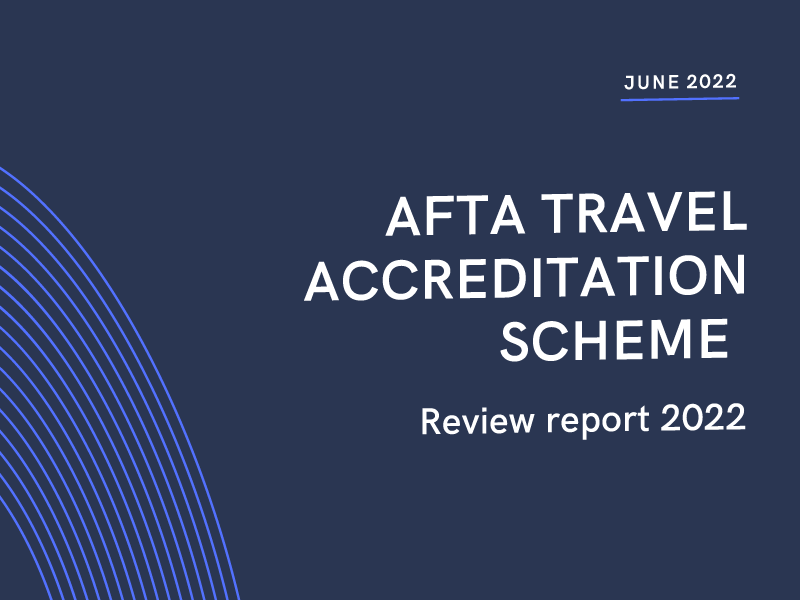A WIDE-RANGING review of the AFTA Travel Accreditation Scheme finalised this week will see the establishment of a new advisory committee comprising AFTA members alongside industry and consumer representatives, with the aim of identifying opportunities “to improve the effectiveness and governance of the scheme and ensuring ATAS continues to add value to industry and consumers”.
That was the outcome of one of 13 key recommendations made by the independent reviewer Graham McDonald, a distinguished legal professional who has worked as both a solicitor and barrister in numerous roles on various official Tribunals and Committees. The AFTA Board has released McDonald’s formal report (CLICK HERE) as well as the Federation’s response, which has accepted 11 of the recommendations, declined one and accepted one with modifications.
As well as the new advisory committee, other significant changes to the scheme include a requirement for the mandatory keeping and reporting of separate client accounts, with annual financial statements submitted to the ATAS scheme required to show deposits and disbursements relating to these accounts.
“By AFTA introducing this standard for all ATAS participants, it further elevates the standard of the industry and meets consumers’ expectations of the desired level of financial management of ATAS participants,” the Board said.
Several outdated clauses which lack clarity are also being removed from the ATAS Charter, and are being replaced with a mandatory requirement that terms and conditions and a schedule of fees must be provided to consumers before any contract or agreement to purchase any travel-related service is concluded. It’s recommended that consumers be asked to acknowledge receipt of this information, with a record retained for future reference.
Accepted recommendations would also preclude the possibility of the AFTA CEO being a possible member of the ATAS Complaints Appeal Committee (ACAC) to ensure compliance with an underlying principle of independence which requires decision-making and administration to be separate from the participating organisation.
As well as responding to the specific recommendations from the review report, the AFTA Board has agreed to “additional changes to improve the operational efficiency of the scheme”, following recommendations from the current ACAC Independent Chair, Hank Spier and ATAS Compliance Manager Naomi Menon. Most of these are procedural, however an interesting change is the introduction of the word “may” into a clause relating to the publication of ATAS membership details.
At present the Charter notes that “the AFTA Board will promote ATAS through its distribution channels… including a register of current ATAS participants as well as a register of participants who have had their accreditation suspended or cancelled and those who have voluntarily withdrawn from the scheme”. Under the proposed changes, the word ‘may’ is to be added to this clause, with the rationale being “to allow discretion to the AFTA Board to operate efficiently”. That “discretion” makes it difficult to assess the overall membership of the scheme, and it’s interesting to note that in fact this is how ATAS has been operating since September last year, with the relevant page on the AFTA website only highlighting suspended or cancelled members, and ceasing to list those which have voluntarily withdrawn from the scheme.
It’s also proposed that ACAC consist of three members with two alternate appointments, allowing for operational efficiency and to reduce the financial burden to AFTA.
The Federation has confirmed that the new version (Version 6) of the ATAS Charter and Code will be released this week, with the changes and what they mean for AFTA members to be detailed in a five-week webinar series.

SUMMARY:
The key changes accepted by the Board include:
- In the event of any conflict between the operation of non-AFTA membership terms and conditions and the ATAS Charter and Code, the ATAS Charter and Code provisions are to prevail – this reflects the possibility that non-AFTA members could join ATAS and be part of a different industry body or association. While currently anyone in ATAS is also part of AFTA, this change allows for the possibility of alternate industry organisation membership but ensures that the provisions of the ATAS scheme would prevail in the case of any conflict.
- Replace the reference to ‘AFTA’ in the acronym of ATAS with ‘Australian’, so that ATAS becomes the Australian Travel Accreditation Scheme – this change has already been flagged by AFTA CEO Dean Long and was a recommendation of the Federation in its submission to the review.
- It is recommended a further right to appeal from the CEO’s decision (refer clause 2.4 of the ATAS Charter) be introduced, but solely limited to determining that natural justice has been extended to an applicant or participant – this was accepted by the Board as strengthening the ATAS process, with an independent natural justice provision enhancing the perception and operation of the scheme.
- Greater resources should be allocated to the promotion of ATAS to the public – the AFTA Board wholeheartedly agreed, while acknowledging the financial impact of COVID-19 on AFTA’s ability to conduct marketing activities. Although not currently being in a position to increase advertising resources for ATAS, AFTA said it would continue to seek opportunities to promote ATAS within its current framework of public relation activities.
- Clause 5.1 of the ACAC Terms of Reference be amended to remove the CEO from being a possible ACAC panel member and that the position be filled by an appointed industry member – this is in line with Federal Treasury standards for industry-based customer dispute resolution, with the AFTA Board accepting that the underlying principle of independence requires the decision-making process and administration to be independent from the participating organisation.
- It is recommended that AFTA, ATAS and ACAC assess the Treasury’s ‘Benchmark for Industry-based Consumer Dispute Resolution’ and determine what complaint data ATAS releases publicly – this is in line with a critical function of ATAS being the release of data identifying systemic issues that the industry can address. The decision on what data should be released “should be decided based on what data benefits improving business processes and consumer confidence,” the AFTA Board suggested.
- It is recommended that the ATAS Code be amended to improve a provision that participants notify consumers that, while it is not compulsory to do so, there is a free of charge right to appeal an adverse decision to the ACAC, which operates independently of the participant – the Board agreed, saying increasing the awareness of the independent appeal process at a business level will improve the awareness and credibility of the scheme.
- It is recommended that the ACAC Terms of Reference remove the requirement to meet quarterly, and be replaced with “as often as the Chair directs” – the Board agreed with this recommendation because it gave greater flexibility in the timing of meetings and will improve the efficiency of the Scheme.
- It is recommended that the Financial Reporting requirements of the ATAS Charter introduce a requirement for the mandatory keeping of separate client accounts showing deposits and disbursements and that this is demonstrated in the annual financial statements – this was accepted by the AFTA Board with plans to introduce the requirement from 2023. Publicly listed entities will be excluded due to their current higher level of oversight from the ASX and ASIC, while the requirements for sole traders requires “further investigation and advice”.
- It is recommended that all ATAS Participants have their financial statements, including a profit and loss statement and balance sheet prepared and certified by an accountant – the Board agreed that it was appropriate that Financial Statements be prepared by a third party in the form of a certified accountant, to ensure that an appropriate standard is set for all ATAS participants.
- It is recommended that the ATAS Code of Conduct make the following changes in relation to Terms and Conditions: repeal clause 4.1(a) and 4.2 – these clauses are legally outdated, and will instead be replaced by a requirement for any travel intermediary to provide copies of terms and conditions and a schedule of fees to consumers prior to any contract or agreement to purchase any travel-related service is concluded.
The review recommendation rejected by the Board was:
- It is recommended that the terms of reference for the ACAC be amended to provide that appointment to the position of Chair have a minimum requirement of being a lawyer of at least five years’ experience – the Board found it was appropriate that appointments to the position are based on merit. While agreeing that having a legal qualification would be a benefit in carrying out the duties of this position, they did not want to make the requirements too narrow.
Finally, the review recommendation declined by the Board but with a proposed alternative approach was:
- AFTA should consider constituting a wholly owned subsidiary company, with a separate board with a broader range of industry and consumer representation, and pass control of the operation of ATAS to that company – the AFTA Board declined this recommendation noting that ATAS as a standalone business would not currently have sufficient resources to be a going concern. However it noted there was a “clear need to have a wider and more representative voice into the operations and governance of ATAS, beyond the three year reviews” and therefore committed to establishing an advisory committee comprising a broad representation of member, industry and consumer representatives.







